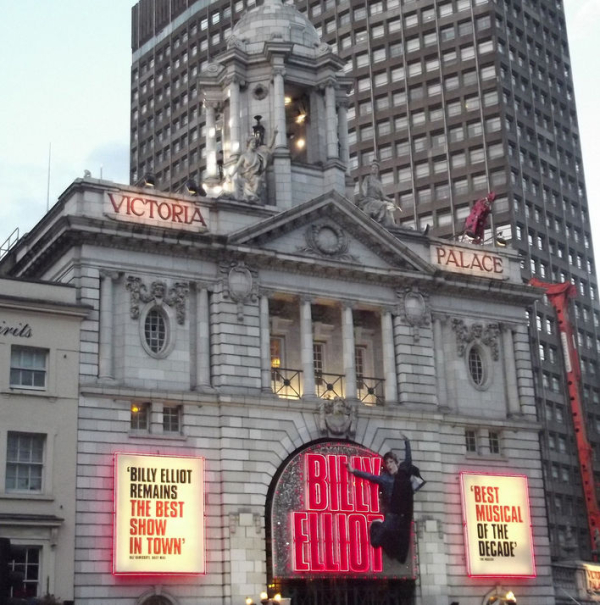Michael Coveney: Mackintosh expands his portfolio as musicals leap forward into the past

© Elliott Brown
Re-naming the Ambassadors the Sondheim also realises a personal dream. Mackintosh had his first real success in the mid-1970s producing his Side by Side by Sondheim revue, and at one stage said that a new theatre to be built across the top of the block on Shaftesbury Avenue housing the Queen's and the Gielgud (both owned by Delfont Mackintosh) would be dubbed in honour of the composer.
That never happened. Now, where once there was The Mousetrap and currently Stomp, the new cosy Ambassadors, which seats 450 people, will be a showcase for the best of the fringe, a quick transfer house for plays that have packed out at the Bush, the Tricycle, the Park or the Orange Tree (where incoming artistic director Paul Miller has some exciting new plans) and deserve further life without all the paraphernalia of an expensive larger theatre. This is a long overdue development and another great feather in the Mackintosh plumage.
You might have thought by now that the future of musical theatre lay in the seeds sown by London Road, American Psycho and American composers – still to make any sort of popular breakthrough – Adam Guettel (grandson of Richard Rodgers) and Jason Robert Brown.
But as Miss Saigon returns to the West End, costs soar, creative nerves falter in a recession and popular musical taste defects completely from musical theatre writing – admittedly a process that's been going on for years – it's now at least clear where the battle lines are being drawn up.
Everything changed in musical theatre when the serious "book" musical, dating from Showboat in 1927, displaced the musical comedy, revue-style show of composers like Rodgers and Hart; Rodgers and Hammerstein were the new defining partnership in the "serious" musical which leads on to West Side Story (the best musical ever written), Lionel Bart, Stephen Sondheim, Rice and Lloyd Webber, Boublil and Schönberg.
But when the contemporary wells of inspiration run dry, the show must still go on, the industry must survive, hence the resort to pop music back catalogues, the raiding of the Disney legacy and the morbid fascination with the possibility of transforming cinematic brand names into theatrical gold.
The proof of the pudding is only in the eating, but the announcement of a new musical of Back to the Future next year only looks, at the moment, like another move in the exploitation of a franchise that has so far added sequels to the 1985 sci-fi comedy classic, as well as an animated cartoon series, theme park rides and video games.
“Everything changed in musical theatre when the serious ‘book’ musical displaced the musical comedy”
“Everything changed in musical theatre when the serious ‘book’ musical displaced the musical comedy”
Even as Miss Saigon re-opens in a production, similar to the re-launch of Les Misérables, that is arguably a shadow of its former self, we learn that Boublil and Schönberg are still tinkering with Martin Guerre and that producer Mackintosh, the man with the biggest back catalogue of all, and the best-maintained theatres, is half-promising a West End resuscitation of Stiles and Drewe’s Betty Blue Eyes.
The latter – like the stage versions of Legally Blonde and Dirty Rotten Scoundrels – marked another unequivocal trend: the return of pre-Showboat musical comedy, to the unmistakeable sound of huge relief all round. When you add really good songs and a first class production – as in Richard Eyre’s revival of The Pajama Game – you hit the bull’s-eye while the future of musical theatre stays on hold.
The consistent and general approval for shows with tough books, ironic values and dynamic production values but not really any good songs – The Book of Mormon, Matilda and Urinetown – needs questioning when big theatre flops like From Here To Eternity and I Can’t Sing! (the latter, weirdly, I loved) expose the widening gap between theatre producers with houses to fill and audiences with souls to satisfy.
And the tragedy is that the failure of Stephen Ward, a show with impeccable creative pedigree and a great composer still game for a standing start on a serious project, puts back the cause a couple more years. You cannot legislate for great new musical theatre, or another Andrew Lloyd Webber. Cameron Mackintosh himself thinks we might be at the end of an era.
In the Daily Telegraph on Wednesday he said: "Most people thought Fiddler on the Roof in 1964 marked the end of the golden era of American musical theatre. But then you had A Chorus Line and 42nd Street. Then Andrew Lloyd Webber and I met, Claude-Michel and I met, and another new era began." Hey new Mr or Mrs Producer – and I’m talking Mackintosh, Hal Prince, Joe Papp – what happened to you, sir? And how on earth will Sir Cameron feed his nine venues with consistently high musical theatre product?
While the Vietnam War rages once again in Miss Saigon, there’s some local ground-level sniping at "sexist" opera critics who this week described Tara Erraught, playing Octavian in Glyndebourne’s new Der Rosenkavalier, as "dumpy," "stocky" and "unbelievable, unsightly and unappealing." What no-one seems to have pointed out is that, as the director is Richard Jones, known for his iconoclastic take on perceived traditional interpretation – Octavian is a transsexual seducer – that this effect is precisely what he, and the singer, were aiming for. Instead, the air hums with the sound of critics haughtily justifying themselves; music to my ears, as it happens, but beside the point.











